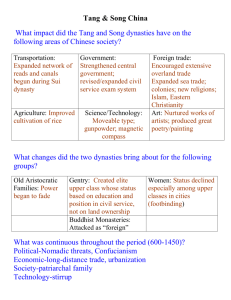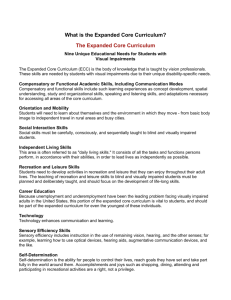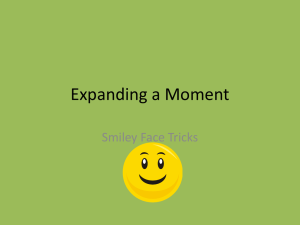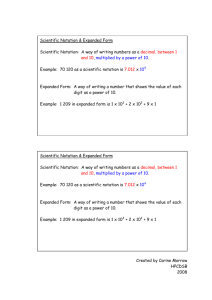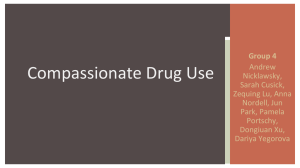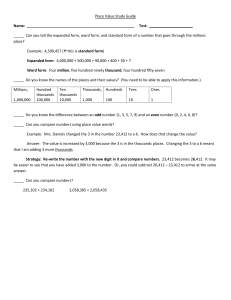Colorado Supreme Court to hear arguments at Clear Creek High
advertisement
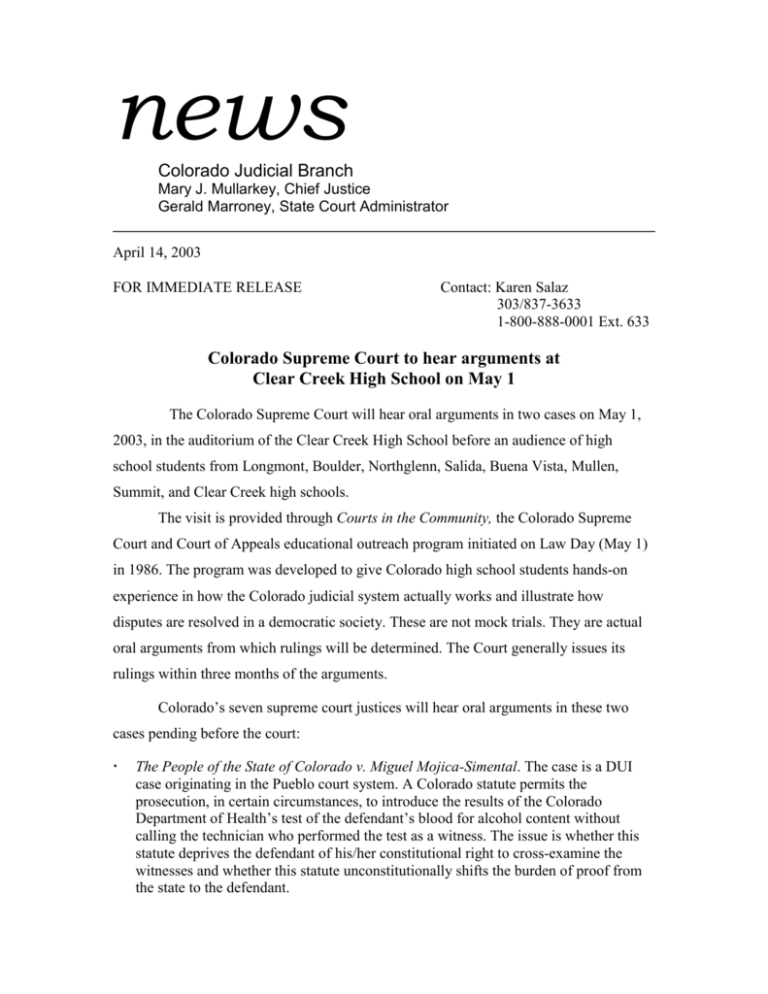
news Colorado Judicial Branch Mary J. Mullarkey, Chief Justice Gerald Marroney, State Court Administrator ________________________________________________________________________ April 14, 2003 FOR IMMEDIATE RELEASE Contact: Karen Salaz 303/837-3633 1-800-888-0001 Ext. 633 Colorado Supreme Court to hear arguments at Clear Creek High School on May 1 The Colorado Supreme Court will hear oral arguments in two cases on May 1, 2003, in the auditorium of the Clear Creek High School before an audience of high school students from Longmont, Boulder, Northglenn, Salida, Buena Vista, Mullen, Summit, and Clear Creek high schools. The visit is provided through Courts in the Community, the Colorado Supreme Court and Court of Appeals educational outreach program initiated on Law Day (May 1) in 1986. The program was developed to give Colorado high school students hands-on experience in how the Colorado judicial system actually works and illustrate how disputes are resolved in a democratic society. These are not mock trials. They are actual oral arguments from which rulings will be determined. The Court generally issues its rulings within three months of the arguments. Colorado’s seven supreme court justices will hear oral arguments in these two cases pending before the court: The People of the State of Colorado v. Miguel Mojica-Simental. The case is a DUI case originating in the Pueblo court system. A Colorado statute permits the prosecution, in certain circumstances, to introduce the results of the Colorado Department of Health’s test of the defendant’s blood for alcohol content without calling the technician who performed the test as a witness. The issue is whether this statute deprives the defendant of his/her constitutional right to cross-examine the witnesses and whether this statute unconstitutionally shifts the burden of proof from the state to the defendant. The People of the State of Colorado v. Campbell. This case is appealed out of the Boulder court system. The Colorado Supreme Court, in a previous opinion, stated that logically a person cannot use an illegal drug without also possessing it. The Campbell case raises the question of whether state statutes regarding possession and use of cocaine violate the Colorado Constitution’s guarantee of equal protection of the law. Current statute punishes possession more harshly than use. The proceedings will begin with opening remarks at 8:30 a.m. on May 1. A question and answer session will follow the presentation of each case allowing the students to ask questions of each of the attorneys. At the conclusion of the second argument, the students will also be given the opportunity to participate in a question and answer session with the Justices. The public is invited to attend. Editor’s note: Please see following pages for media coverage. This information is provided as an e-mail service of the Colorado State Judicial Branch, Office of State Court Administrator, 1301 Pennsylvania Street, Suite 300, Denver, Colo. 80203. To discontinue this service or update your e-mail address, please respond to this message with your name, contact information and any comments. Media opportunity What: When: Where: Colorado Supreme Court Oral Arguments 8:30-1:00 a.m., May 1, 2003 Clear Creek High School, 185 Beaver Canyon Road, Evergreen, CO 80439 I. Photo opportunities. During oral arguments, the requirements set forth in Canon 3(A)(8) of the Code of Judicial Conduct are in effect. The applicable section of Canon 3 is attached. Highlights include: a. A written request for expanded media coverage must be filed in advance with copies to counsel for the parties; b. If granted, only one video camera and/or one still camera is allowed, and that media source must share and pool its coverage with other media. c. No flash attachments or lighted television cameras are allowed during the arguments. d. The camera operator may use a tripod, but shall not change location while court is in session. For information, contact Karen Salaz 303/837-3633. Following each argument, during the question and answer interaction between the students, lawyers and judges, access is open for media opportunities without the limitations of Canon 3. Media representatives are also welcome to photograph the luncheon immediately following the cases. II. Schedule. 7:30 a.m. – 8:20 a.m. 8:30 a.m. – 8:45 a.m. 8:45 a.m. – 9:45 a.m. 9:45 a.m. – 10:00 a.m. 10:00 a.m. – 10:15 a.m. 10:15 a.m. – 11:15 a.m. 11:15 a.m. – 11:30 a.m. 11:30 a.m. – 11:45 a.m. 12:00 p.m. – 1:00 p.m. Welcome Reception/Coffee Invited guests (Media Center) Opening Remarks Auditorium 02SC44 The People v. Mojica-Simental Supreme Court Conferences Question & Answer Session between Attorneys and Students (Stage) Break 02SC454 Campbell v. The People Supreme Court Conferences Question & Answer Session between Attorneys and Students (Stage) Question & Answer Session between Justices and Students (Stage) Lunch Justices and selected students (Band Room) III. Directions to Clear Creek High School. Take I-70 west from Denver Exit No. 248, turn right at stop sign at top of overpass and take an immediate left at second stop sign onto frontage road (Road 40). You will be driving west parallel to the interstate. Proceed west on frontage road to stop sign. Turn left at stop sign; proceed over overpass to next stop sign. Turn left onto Beaver Brook and proceed to driveway of the high school (about ¼ mile). Turn left into high school. There is a green and white highway sign at the driveway. IV. Request for Expanded Media Coverage. A written request for expanded media coverage must be submitted to Mac Danford, Clerk of the Court, by Monday, April 28, 2003. A fill-inthe-blank request form is attached. Request for Expanded Media Coverage Name of media group:__________________________________________________ Contact person:________________________________________________________ Address:______________________________________________________________ Phone Number/E-mail___________________________________________________ Date of proceedings: May 1, 2003 Time of proceedings: 8:45 a.m. _____ No. 02SC44, People v. Mojica-Simental 10:15 a.m. _____ No. 02SC454, Campbell v. The People The type of expanded media coverage requested: ____ audio ____ video ____ still photography Description of the pooling arrangements required by section (e)(II), including the identity of the designated representatives: __________________________________________________________________ __________________________________________________________________ __________________________________________________________________ __________________________________________________________________ __________________________________________________________________ __________________________________________________________________ For more information contact Karen Salaz at 303-837-3633. Requests must be submitted by Monday, April 28, 2003, to Mac Danford, Clerk of the Supreme Court, Colorado State Judicial Building, Two East 14th Ave., Fourth Floor, Denver, Colo. 80203, 303/861-7429 (fax). Colorado Expanded Media Coverage of Court Proceeding Canon 3. A Judge Should Perform the Duties of His or Her Office Impartially and Diligently. (8) Judicial Supervision over Expanded Media Coverage of Court Proceedings. A judge may authorize expanded media coverage of court proceedings, in addition to those referred to in section (7) of this Canon, subject to the guidelines set forth below. (a) Definitions. As used in this section, unless the context otherwise requires: (I) “Proceeding” means any trial, hearing, or any other matter held in open court which the public is entitled to attend. (II) “Photograph” and “photography” means all recording or broadcasting of visual images, by means of still photographs, videotape, television broadcasts, motion pictures, or otherwise. (III) “Expanded media coverage” means any photography or audio recording of proceedings. (IV) “Judge” means the justice, judge, referee, or other judicial officer presiding over the proceedings. In proceedings with more than one judge presiding, any decision required shall be made by a majority of the judges. (V) “Media” means any news gathering or reporting agency and the individual persons involved, and includes newspapers, radio, television, radio and television networks, news services, magazines, trade papers, in-house publications, professional journals, or any other news reporting or news gathering agency whose function it is to inform the public or some segment thereof. (b) Standards for Authorizing Coverage. In determining whether expanded media coverage should be permitted, a judge shall consider the following factors: (I) Whether there is a reasonable likelihood that expanded media coverage would interfere with the rights of the parties to a fair trial; (II) Whether there is a reasonable likelihood that expanded media coverage would unduly detract from the solemnity, decorum and dignity of the court; and (III) Whether expanded media coverage would create adverse effects which would be greater than those caused by traditional media coverage. (c) Limitations on Expanded Media Coverage. Notwithstanding an authorization to conduct expanded media coverage of a proceeding, there shall be no: (I) Expanded media coverage of pretrial hearings in criminal cases, except advisements and arraignments; (II) Expanded media coverage of jury voir dire; (III) Audio recording or “zoom” closeup photography of bench conferences; (IV) Audio recording or closeup photography of communications between counsel and client or cocounsel; (V) Expanded media coverage of in camera hearings; (VI) Closeup photography of members of the jury. (d) Authority to Impose Restrictions on Expanded Media Coverage. A judge may restrict or limit expanded media coverage as may be necessary to preserve the dignity of the court or to protect the parties, witnesses, or jurors. A judge may terminate or suspend expanded media coverage at any time upon making findings of fact that: (1) rules established under this Canon or additional rules imposed by the judge have been violated; or (2) substantial rights of individual participants or rights to a fair trial will be prejudiced by such coverage if it is allowed to continue. (e) Conditions for Coverage. Expanded media coverage shall be conducted only under the following conditions: (I) Equipment Limitations. (aa) Video. Only one person at a time shall be permitted to operate a videotape, television, or motion picture camera. There shall be only one such camera at a time in the courtroom, except that, at the discretion of the judge, the camera operator may have a second camera. The camera operator may use a tripod, but shall not change location while court is in session. (bb) Audio. The court’s audio system shall be used if technically suitable and, in that event, there must be no interference with the court’s use of its system. If the court’s system is not technically suitable, then the person conducting expanded media coverage may install an audio recording system at his or her own expense upon first obtaining approval of the judge. All microphones and related wiring shall be unobtrusive and shall not interfere with the movement of those in the courtroom. (cc) Still Cameras. Only one person at a time shall be permitted to operate still cameras, which shall make as little noise as possible. The still photographer may use a tripod, but shall not change location while court is in session. (dd) Lighting. No movie lights, flash attachments, or sudden lighting changes shall be permitted during a proceeding. No modification or addition of lighting equipment shall be permitted without the permission of the judge. (ee) Operating Signals. No visible or audible light or signal (tally light) shall be used on any equipment. (II) Pooling Arrangements. The media shall be solely responsible for designating one media representative to conduct each of the categories of expanded media coverage listed in subsection (I) of this section, and for arranging an open and impartial distribution scheme with a distribution point located outside of the courtroom. If no agreement can be reached on either of these matters, then there shall be no expanded media coverage of the type for which no pooling agreement has been made. Neither judges nor other court personnel shall be called upon to resolve any disputes concerning such pooling arrangements. (III) Conduct of Media Representatives. Persons conducting expanded media coverage shall conduct themselves in a manner consistent with the decorum and dignity of the courtroom. The following practices shall apply: (aa) Equipment employed to provide expanded media coverage shall be positioned and operated so as to minimize any distraction; (bb) Identifying marks, call letters, logos, symbols, and legends shall be concealed on all equipment. Persons operating such equipment shall not wear clothing bearing any such identifying information; (cc) Equipment used to provide expanded media coverage shall not be placed in, or removed from, the courtroom while court is in session. No film, videotape, or lens shall be changed within a courtroom while court is in session. (f) Procedures. The following procedures shall be followed in obtaining authorization for expanded media coverage: (I) Request for Expanded Media Coverage. A written request shall be submitted to the judge at least one day before expanded media coverage is requested to begin, unless a longer or shorter time is required or permitted by the judge. Copies of the request shall be given to counsel for each party participating in the proceeding. The request shall include the following: (aa) The name, number, date and time of the proceeding; (bb) The type (audio, video, or still photography) of expanded media coverage requested and a description of the pooling arrangements required by section (e)(II), including the identity of the designated representatives. (II) Objections. Any party or witness may lodge with the judge a written objection to expanded media coverage of all or a portion of a proceeding. (III) Judicial Authorization. The judge shall rule on a request or objection within a reasonable time prior to the proceeding or promptly after the request or objection if the proceeding has begun. The ruling shall be made on the record and the reasons therefore set forth briefly. (IV) The media or any witness may not appeal, or seek review by original proceeding, the granting or denial of expanded media coverage. A party may seek review of a ruling by original proceeding, if otherwise appropriate, or by post-trial appeal.
